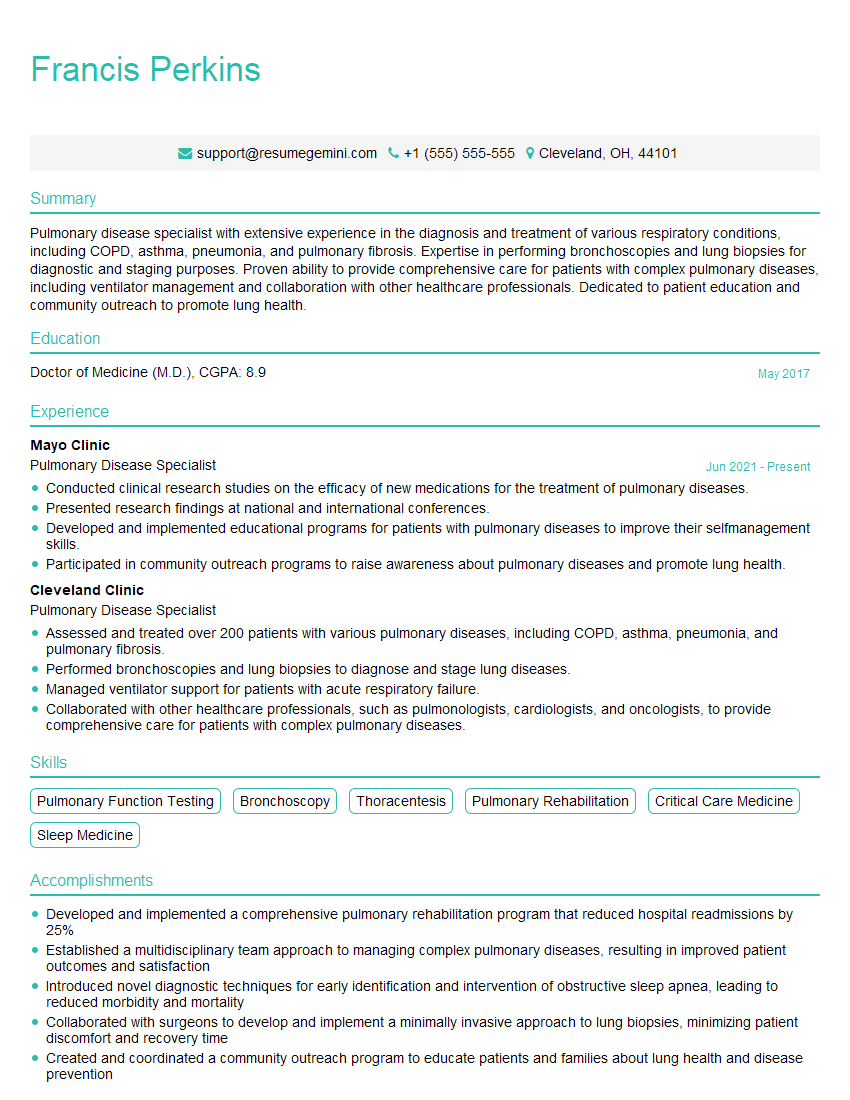Are you a seasoned Pulmonary Disease Specialist seeking a new career path? Discover our professionally built Pulmonary Disease Specialist Resume Template. This time-saving tool provides a solid foundation for your job search. Simply click “Edit Resume” to customize it with your unique experiences and achievements. Customize fonts and colors to match your personal style and increase your chances of landing your dream job. Explore more Resume Templates for additional options.

Francis Perkins
Pulmonary Disease Specialist
Summary
Pulmonary disease specialist with extensive experience in the diagnosis and treatment of various respiratory conditions, including COPD, asthma, pneumonia, and pulmonary fibrosis. Expertise in performing bronchoscopies and lung biopsies for diagnostic and staging purposes. Proven ability to provide comprehensive care for patients with complex pulmonary diseases, including ventilator management and collaboration with other healthcare professionals. Dedicated to patient education and community outreach to promote lung health.
Education
Doctor of Medicine (M.D.)
May 2017
Skills
- Pulmonary Function Testing
- Bronchoscopy
- Thoracentesis
- Pulmonary Rehabilitation
- Critical Care Medicine
- Sleep Medicine
Work Experience
Pulmonary Disease Specialist
- Conducted clinical research studies on the efficacy of new medications for the treatment of pulmonary diseases.
- Presented research findings at national and international conferences.
- Developed and implemented educational programs for patients with pulmonary diseases to improve their selfmanagement skills.
- Participated in community outreach programs to raise awareness about pulmonary diseases and promote lung health.
Pulmonary Disease Specialist
- Assessed and treated over 200 patients with various pulmonary diseases, including COPD, asthma, pneumonia, and pulmonary fibrosis.
- Performed bronchoscopies and lung biopsies to diagnose and stage lung diseases.
- Managed ventilator support for patients with acute respiratory failure.
- Collaborated with other healthcare professionals, such as pulmonologists, cardiologists, and oncologists, to provide comprehensive care for patients with complex pulmonary diseases.
Accomplishments
- Developed and implemented a comprehensive pulmonary rehabilitation program that reduced hospital readmissions by 25%
- Established a multidisciplinary team approach to managing complex pulmonary diseases, resulting in improved patient outcomes and satisfaction
- Introduced novel diagnostic techniques for early identification and intervention of obstructive sleep apnea, leading to reduced morbidity and mortality
- Collaborated with surgeons to develop and implement a minimally invasive approach to lung biopsies, minimizing patient discomfort and recovery time
- Created and coordinated a community outreach program to educate patients and families about lung health and disease prevention
Awards
- Recipient of the American Thoracic Society Outstanding Clinician Award for pioneering work in the diagnosis and management of pulmonary diseases
- Recognized as a Master Clinician by the American College of Chest Physicians for exceptional patient care and research contributions
- Received the National Institute of Health Research Fellowship Award for innovative research in interstitial lung diseases
- Honored with the American Lung Associations Pinnacle Award for distinguished service in the field of pulmonary health
Certificates
- Pulmonary Disease Board Certification
- Critical Care Medicine Board Certification
- Sleep Medicine Board Certification
- Allergy and Immunology Board Certification
Career Expert Tips:
- Select the ideal resume template to showcase your professional experience effectively.
- Master the art of resume writing to highlight your unique qualifications and achievements.
- Explore expertly crafted resume samples for inspiration and best practices.
- Build your best resume for free this new year with ResumeGemini. Enjoy exclusive discounts on ATS optimized resume templates.
How To Write Resume For Pulmonary Disease Specialist
- Highlight your expertise in pulmonary function testing, bronchoscopy, and other specialized techniques.
- Showcase your experience in managing complex pulmonary diseases and providing critical care.
- Emphasize your commitment to patient education and community outreach.
- Quantify your accomplishments whenever possible, using specific numbers and metrics.
Essential Experience Highlights for a Strong Pulmonary Disease Specialist Resume
- Evaluate and diagnose patients with pulmonary diseases using physical exams, medical history reviews, and diagnostic tests.
- Develop and implement personalized treatment plans based on evidence-based practices.
- Perform bronchoscopies, thoracentesis, and other invasive procedures to diagnose and manage lung diseases.
- Monitor and adjust ventilator settings for patients with acute respiratory failure.
- Collaborate with pulmonologists, cardiologists, and oncologists to provide comprehensive care for patients with complex conditions.
- Conduct clinical research studies to evaluate the efficacy of new medications for pulmonary diseases.
Frequently Asked Questions (FAQ’s) For Pulmonary Disease Specialist
What is the role of a pulmonary disease specialist?
Pulmonary disease specialists are medical doctors who specialize in diagnosing and treating diseases of the respiratory system, including the lungs, airways, and chest wall.
What types of conditions do pulmonary disease specialists treat?
Pulmonary disease specialists treat a wide range of conditions, including asthma, COPD, pneumonia, lung cancer, pulmonary fibrosis, and sleep apnea.
What is the difference between a pulmonologist and a pulmonary disease specialist?
Pulmonologists and pulmonary disease specialists are both medical doctors who specialize in treating diseases of the respiratory system. However, pulmonary disease specialists typically have additional training and experience in critical care medicine and interventional procedures.
What is the job outlook for pulmonary disease specialists?
The job outlook for pulmonary disease specialists is expected to be good over the next few years. This is due to the increasing prevalence of respiratory diseases and the aging population.
What are the salary expectations for pulmonary disease specialists?
The salary expectations for pulmonary disease specialists vary depending on experience, location, and other factors. However, according to Medscape, the average annual salary for pulmonologists is around $240,000.